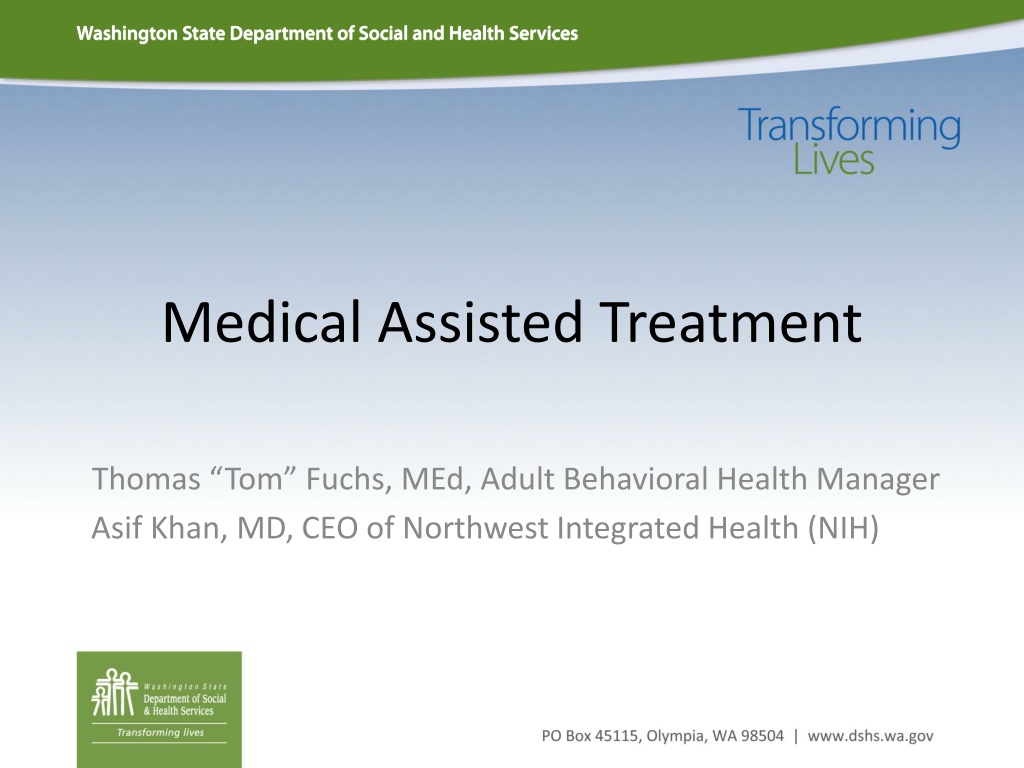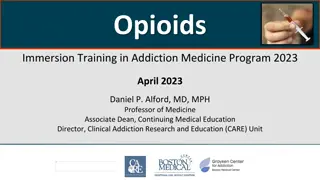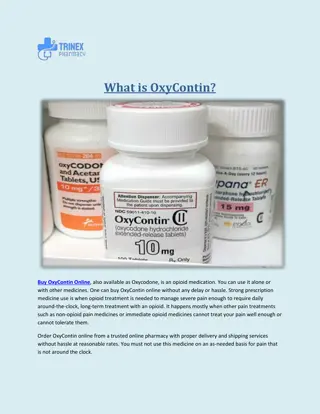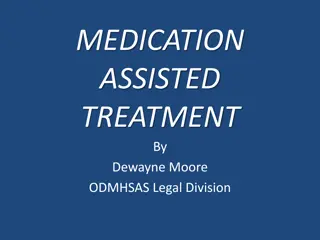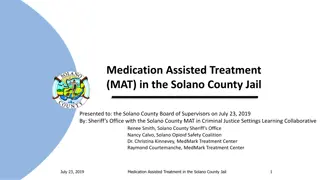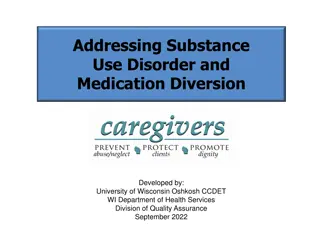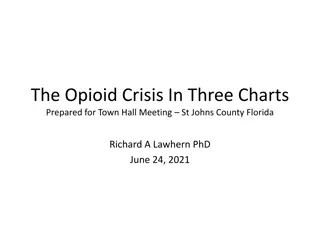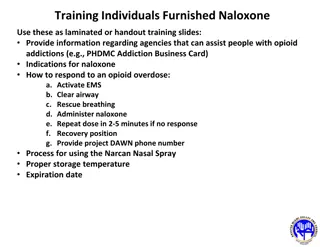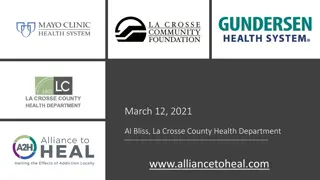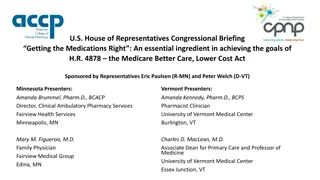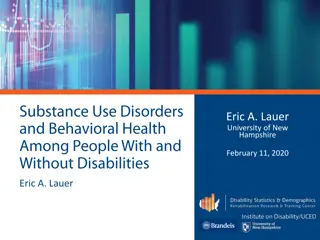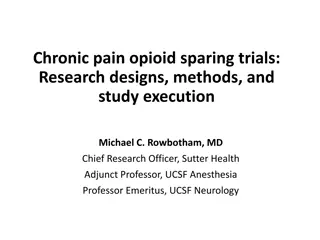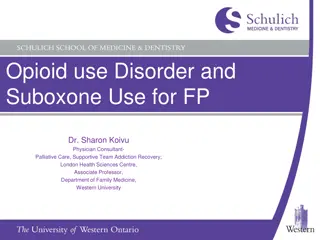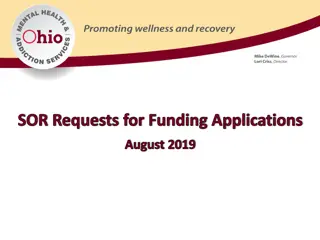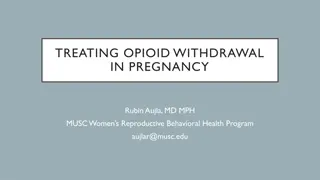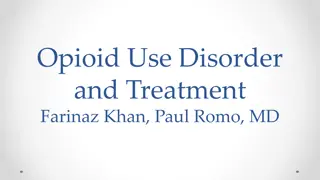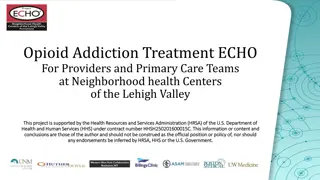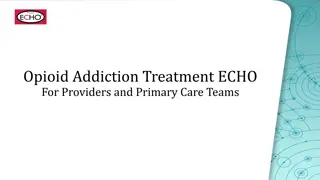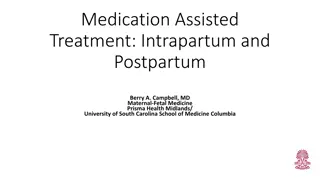Understanding Medication Assisted Treatment for Opioid Use Disorder
Gain insights into Medication Assisted Treatment (MAT) for Opioid Use Disorder (OUD), including types of MAT medications, mechanisms of action, dispelling myths, understanding dependency versus addiction, and the role of MAT and therapy in stabilization and recovery.
Download Presentation

Please find below an Image/Link to download the presentation.
The content on the website is provided AS IS for your information and personal use only. It may not be sold, licensed, or shared on other websites without obtaining consent from the author. Download presentation by click this link. If you encounter any issues during the download, it is possible that the publisher has removed the file from their server.
E N D
Presentation Transcript
Medical Assisted Treatment Thomas Tom Fuchs, MEd, Adult Behavioral Health Manager Asif Khan, MD, CEO of Northwest Integrated Health (NIH)
Learning Objectives Gain a deeper understanding of Medication Assisted Treatment Know the three types of MAT medications, Mechanisms of Action Challenging the myths about Medication Assisted Treatment (MAT) for Opioid Use Disorder (OUD) Understand the difference between Dependency and a Substance Use Disorder
Three Medications Methadone Buprenorphine, with Naloxone or without Suboxone, Zubsolv Subutex Naltrexone, oral and injectable Oral Injectable, Vivitrol
Mechanisms of Action Methadone- Full Agonist Suboxone-Partial Agonist Vivitrol-Antagonist
Role of MAT and Therapy Stabilization Recognition of difference between dependent and addiction Each affect different parts of the brain Stress/Conflict and its affect on relapse Trauma
Addiction or Dependent? Dependent- the brain has adapted to the effects of a substance, requiring regular and consistent and increasing amounts of the substance to create the same effect. Addiction- dependency with maladaptive behavior to access the substance, taking more than prescribed, by alternative methods, and significant preoccupations to find, acquire and use the substance through any means necessary.
MAT Options Methadone: Dependency, Higher potential for some addictive behaviors, some diversion, Highly lethal Suboxone: Dependency, more potential for diversion, potential for less addictive behavior, not lethal Vivitrol: No Dependency, no potential for addictive behaviors from medication, no diversion, not lethal
CHALLENGING THE MYTHS ABOUT MEDICATION ASSISTED TREATMENT (MAT) FOR OPIOID USE DISORDER (OUD) Used with Permission: FOR MORE INFORMATION, PLEASE CONTACT NICK SZUBIAK, DIRECTOR, CLINICAL EXCELLENCE IN ADDICTIONS, AT NICKS@THENATIONALCOUNCIL.ORG
Why not Vivitrol for all? Brain changes Length of SUD Onset of use Trauma Stage of change Detox needs Co-occurring potential
Why not Methadone or Suboxone for all? Short duration of use May not fit lifestyle Stages of change Inability to separate from using lifestyle Societal/family pressure Brain changes
Who/How to decide which MAT? Patient Chemical Dependency Professional Doctors ASAM Assessment Judges, Drug Court treatment team Personal bias plays a role in decision Recognition of scope of practice No definitive process
Principles of Effective Treatment 1. 2. 3. 4. 5. 6. 7. Addiction is a complex but treatable disease that affects brain function and behavior. No single treatment is right for everyone. People need to have quick access to treatment. Effective treatment addresses all of the patient s needs, not just his or her drug use. Staying in treatment long enough is critical. Counseling and other behavioral therapies are the most commonly used forms of treatment. Medications are often an important part of treatment, especially when combined with behavioral therapies. Treatment plans must be reviewed often and modified to fit the patient s changing needs. Treatment should address other possible mental disorders. Medically assisted detoxification is only the first stage of treatment. Treatment doesn't need to be voluntary to be effective. Drug use during treatment must be monitored continuously. Treatment programs should test patients for HIV/AIDS, hepatitis B and C, tuberculosis, and other infectious diseases as well as teach them about steps they can take to reduce their risk of these illnesses. (NIDA) 8. 9. 10. 11. 12. 13.
